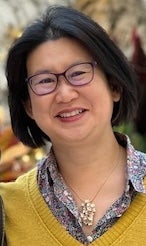CCT Professor Highlight: Irene Wu Publishes “Measuring Soft Power in International Relations”

CCT is excited to spotlight Professor Irene Wu for the release of her new book “Measuring Soft Power in International Relations”
Irene Wu is a professor at CCT and a Senior Analyst at the Federal Communications Commission. Before coming to Georgetown, she completed her undergraduate at Harvard, then, spent a year studying abroad in Taiwan. Upon returning to the United States, she completed her MA and PhD studies at Johns Hopkins where she studied Chinese politics and international economics.
Wu’s academic and professional background gives her a unique perspective to consider international relations both through a political and economic perspective. This has greatly influenced the way she has approached studying soft power. In Wu’s words, “something all international relations political scientists spend a lot of time thinking about is soft power. However, there has been no real consensus on how to measure soft power among academics”. Soft power is typically conceptualized as intangible, but Wu says, “We measure intangible things all the time. Like the temperature. We find a way to do it. What I settled on is that the best indicator of interest in a foreign country is someone taking an action related to that country, for example, watching a movie from that country, or visiting that country, or attending university in that country, or even emigrating to that country.”
In the past, public opinion surveys have been the main way of quantifying soft power, but they’re very expensive, and you can only talk to people for so long, and you really can’t talk to people from every country.” Wu’s rubric for measuring soft power relies on existing international data sets, not only reducing costs but increasing both the quality and quantity of data. Because of her economics background, Wu says she has a certain kind of faith in the data, looking at the trends defined by her rubric “really help [researchers] see over time how we want to use these metrics to compare countries. [Soft power] is no longer this intangible thing.”
Soft power is essential in studying international relations as it can greatly contribute to a country’s political and economic power. For example, according to Wu, “when the U.S. has a higher foreign approval in foreign countries, it’s more likely to get backing for its U.N. resolutions. We saw this in the early part of the century with the war in Iraq.” In this example, soft power has a direct effect on political engagement, but the impact of soft power extends to other forms of engagement as well such as cultural and educational engagement. During our conversation, Professor Wu referenced the work of Carol Atkinson, whose research on international education experiences of military officers showed that the experience of living in the US increased their understanding of democracy. Atkinson’s work ties into Wu’s research in that Wu feels that the most important aspect of soft power is this capacity for person-to-person interaction.
It’s important to note that the person-to-person interaction Wu refers to can be mediated by digital technologies. For example, take an event like the Olympics. These kinds of global sporting events can have a significant impact on participating countries’ soft power. Wu says, “First of all, the Olympics gives its viewers a chance to see and engage with other countries. There are a lot of countries that aren’t really mentioned in the American public sphere that all of a sudden people get to hear about, to cheer for. These events are chances for people to get that person-to-person interaction, whether that’s as viewers, as spectators, as athletes, as volunteers…. This is an incredible way to foster that person-to-person engagement. And the biggest soft power impact is for the host country. This year, people from all over the world get to meet French people in this friendly capacity. This is a really positive thing for France.”

This digital mediation of soft power ties directly into Professor Wu’s other area of expertise, how technology fosters trust between people. This is a primary focus of Wu’s book “Forging Trust Communities: How Technology Changes Politics” and her course this upcoming fall, Tech For Political Change. This relationship between trust and technology is “a strong throughline between both my research and my teaching. It is a core tenant of not only my course this fall but the way I study and talk about soft power.”
To learn more about Irene Wu’s work, check out her LinkedIn profile and preorder Measuring Soft Power in International Relations here.